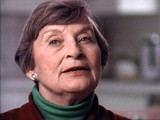You searched for: ust交易程序後臺源碼【tg���������@ek7676】平台包网搭建unit交易程序後臺源碼【tg���������@ek7676】平台包网搭建ivkcss1pgu
<< Previous | Displaying results 1701-1710 of 1751 for "ust交易程序後臺源碼【tg���������@ek7676】平台包网搭建unit交易程序後臺源碼【tg���������@ek7676】平台包网搭建ivkcss1pgu" | Next >>
-
Charlene Schiff describes forced labor in the Horochow ghetto
Oral HistoryBoth of Charlene's parents were local Jewish community leaders, and the family was active in community life. Charlene's father was a professor of philosophy at the State University of Lvov. World War II began with the German invasion of Poland on September 1, 1939. Charlene's town was in the part of eastern Poland occupied by the Soviet Union under the German-Soviet Pact of August 1939. Under the Soviet occupation, the family remained in its home and Charlene's father continued to teach. The Germans…
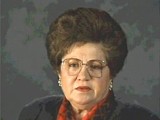
-
Henny Fletcher Aronsen describes liberation from a death march from Stutthof
Oral HistoryHenny was born into an upper-middle-class Jewish family in Kovno, Lithuania. She and her brother attended private schools. In June 1940 the Soviets occupied Lithuania, but little seemed to change until the German invasion in June 1941. The Germans sealed off a ghetto in Kovno in August 1941. Henny and her family were forced to move into the ghetto. Henny married in the ghetto in November 1943; her dowry was a pound of sugar. She survived several roundups during which some of her friends and family were…
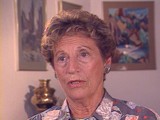
-
Blanka Rothschild describes returning to Lodz after the war to look for family members
Oral HistoryBlanka was an only child in a close-knit family in Lodz, Poland. Her father died in 1937. After the German invasion of Poland, Blanka and her mother remained in Lodz with Blanka's grandmother, who was unable to travel. Along with other relatives, they were forced into the Lodz ghetto in 1940. There, Blanka worked in a bakery. She and her mother later worked in a hospital in the Lodz ghetto, where they remained until late 1944 when they were deported to the Ravensbrueck camp in Germany. From Ravensbrueck,…
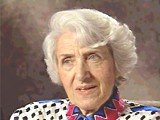
-
Madeline Deutsch describes adjusting to social and educational life after the war
Oral HistoryMadeline was born into a middle class family in an area of Czechoslovakia that was annexed by Hungary in 1938-1939. Her father worked out of their home and her mother was a homemaker. Madeline attended high school. In April 1944 her family was forced into a Hungarian ghetto. The family lived in the ghetto for two weeks before being transported to Auschwitz. Madeline and her mother were separated from her father and older brother. Neither her father nor brother survived the war. A week after arriving in…
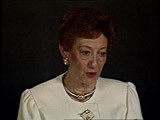
-
Doriane Kurz describes how she and her brother were hidden
Oral HistoryDoriane's Jewish family fled to Amsterdam in 1940, a year that also saw the German occupation of the Netherlands. Her father perished after deportation to Auschwitz. After their mother was seized, Doriane and her brother hid with gentiles. The three were reunited at Bergen-Belsen, where they were deported via Westerbork. They were liberated during the camp's 1945 evacuation. Doriane's mother died of cancer soon after Doriane helped her recover from typhus. Doriane and her brother immigrated to the United…
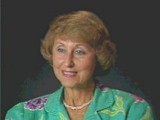
-
Aron (Dereczynski) Derman describes escape from a train during deportation from Grodno in 1943
Oral HistoryAron was born to a middle-class Jewish family in Slonim, a part of Poland between the two world wars. His parents owned a clothing store. After studying in a technical school, Aron worked as a motion-picture projectionist in a small town near Slonim. The Soviet army took over Slonim in September 1939. War broke out between Germany and the Soviet Union in June 1941. Aron returned to Slonim. The Germans soon occupied Slonim, and later forced the Jews into a ghetto. Aron was forced to work in an armaments…
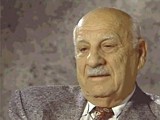
-
Alisa (Lisa) Nussbaum Derman describes her escape from Slonim during a roundup in 1941
Oral HistoryLisa was one of three children born to a religious Jewish family. Following the German occupation of her hometown in 1939, Lisa and her family moved first to Augustow and then to Slonim (in Soviet-occupied eastern Poland). German troops captured Slonim in June 1941, during the invasion of the Soviet Union. The Germans established a ghetto in Slonim in late 1941, following the massacre of thousands of Jews—especially those who could not prove that they worked. Lisa escaped from Slonim and joined the…
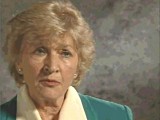
-
Wilek (William) Loew describes the roundup of Jews during August 1942 deportation from Lvov to Belzec
Oral HistoryWilek was the son of Jewish parents living in the southeastern Polish town of Lvov. His family owned and operated a winery that had been in family hands since 1870. Wilek's father died of a heart attack in 1929. Wilek entered secondary school in 1939. Soon after he began school, World War II began with the German invasion of Poland. Lvov was in the part of eastern Poland annexed by the Soviet Union. Although the Soviets took over Wilek's home and the family business, Wilek was able to continue his…
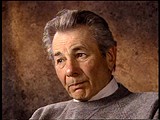
-
Henny Fletcher Aronsen describes a roundup in the Kovno ghetto
Oral HistoryHenny was born into an upper-middle-class Jewish family in Kovno, Lithuania. She and her brother attended private schools. In June 1940 the Soviets occupied Lithuania, but little seemed to change until the German invasion in June 1941. The Germans sealed off a ghetto in Kovno in August 1941. Henny and her family were forced to move into the ghetto. Henny married in the ghetto in November 1943; her dowry was a pound of sugar. She survived several roundups during which some of her friends and family were…
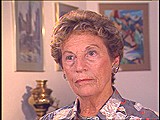
-
Selma (Wijnberg) Engel describes deportation to Sobibor
Oral HistorySelma was the youngest of four children born to Jewish parents. When she was 7, Selma and her family moved to the town of Zwolle where her parents ran a small hotel. When the Germans invaded the Netherlands in 1940, they confiscated the hotel. The family had to live in a poor Jewish section of the town. Selma went into hiding but was betrayed and then sent to the Westerbork camp. In April 1943 she was deported to Sobibor, where she worked in the clothes sorting area. There, the prisoners tried to pocket…
